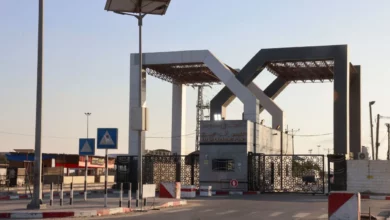GAZA CITY – Hamas officials were hashing out a strategy with Egyptian intelligence officers Saturday how to transfer an Israeli soldier they have held captive for the past five years to Israel, a senior Hamas official said.
How to transfer Sergeant Gilad Shalit is expected to be the trickiest part of a prisoner swap deal announced Tuesday that will see Israel release 1027 Palestinian prisoners in exchange for the soldier, who Hamas-backed militants have kept in hiding since capturing him in a 2006 cross-border raid.
Keeping the soldier's place of captivity a secret for the past five years is widely recognized as a significant achievement for Hamas and the other Palestinian factions that helped seized him, and the groups are wary of spoiling that success with a false step now.
Hamas officials discussed the issue with Egyptian intelligence figures in Cairo on Saturday, a senior Hamas official said on condition of anonymity because he was not authorized to brief the press. He would not say what strategy was agreed upon, only that "different scenarios" were under consideration.
The general plan, however, is to transfer Shalit from Hamas custody to Egypt, and Cairo would then hand the soldier over to Israel.
The International Committee of the Red Cross will be present for Shalit's hand over. But the organization will not have a role in ferrying him out of Gaza, the official said.
He would not say where or when Shalit would be transferred to Egyptian custody, but said the Israeli would not be handed over to Egyptian officials at the border crossing with the Gaza Strip.
Shalit is expected to be returned to Israel on Tuesday, but it is not clear whether the whole operation to transfer him from Gaza to Egypt, and then back home, will all occur on the same day.
Some militants involved in hiding Shalit said they feared Israeli forces would seize the soldier if they knew of his location before he was spirited to Egypt, the Hamas official said.
Other militants – in the Gaza Strip and in Egypt's lawless Sinai, which borders the territory – may also try harm the captive soldier.
Still, those scenarios appears unlikely. Israel, Egypt and Gaza's Hamas rulers appear intent on ensuring the deal's success.
Israel is expected to release around 450 Palestinian prisoners on the same day that Shalit is released. That is expected to an easier operation – released prisoners are typically left at Israeli checkpoints in the West Bank, or at the entrance to Gaza. Palestinian buses ferry them back home.




